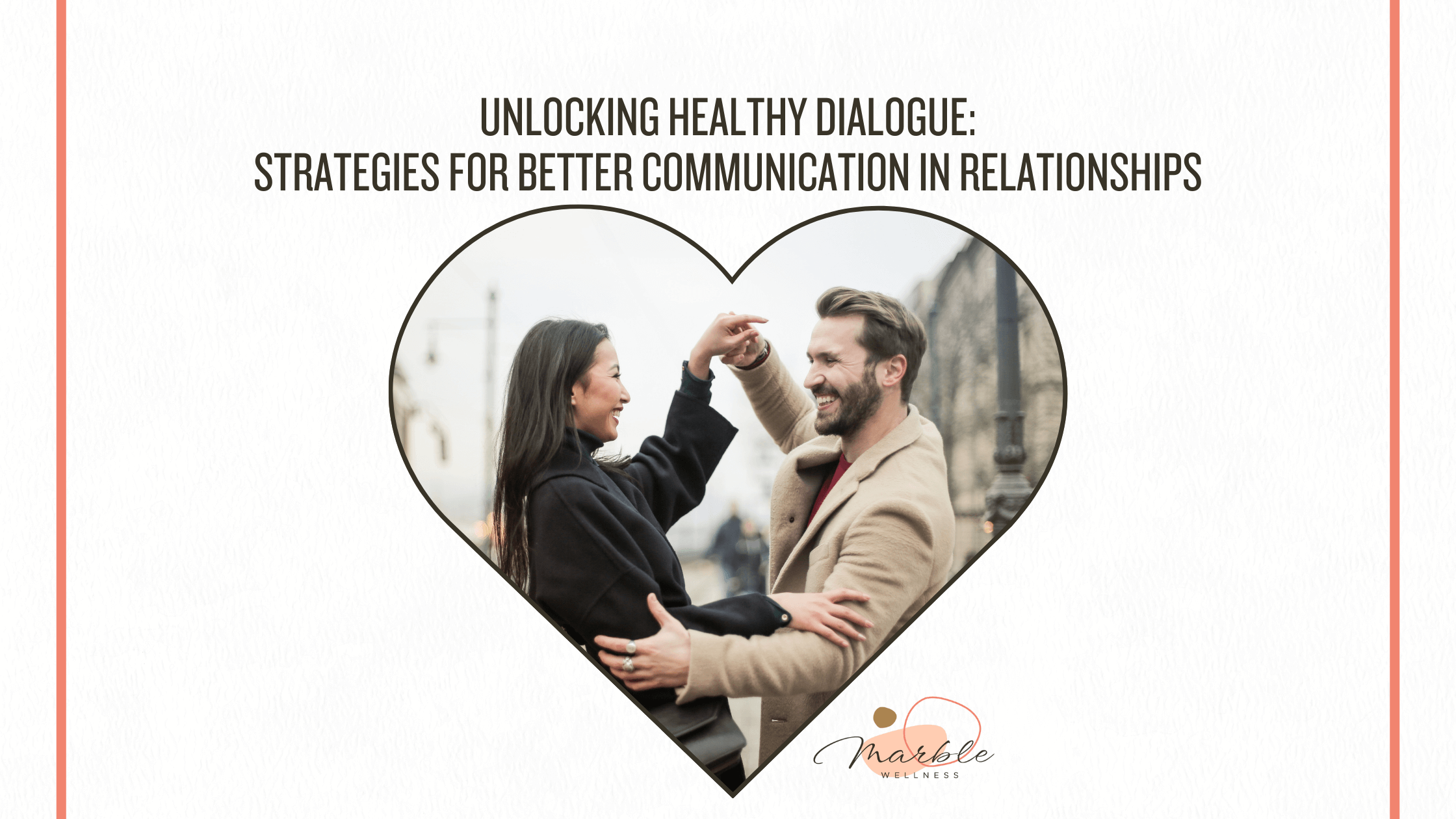Relationships can sometimes be challenging, and conflicts are a part of them.
But conflict can just suck sometimes. Well, probably most of the time.
However, having conflict doesn’t mean you have to feel unequipped. Like most other hardships in life, if you have a robust amount of tools and strategies for managing the problem, the issue becomes less overwhelming, feels less defeating, and can make you feel stronger about your relationship as a whole.
Conflict resolutions strategies may take time to build. It takes consistency, and also commitment. It may take some trial and error. Some bumbling around and through them to try on for size what works in your relationship.
But it’s so, so worth it.
So, without further ado:
Healthy Conflict Resolution Tips for Couples from a St. Louis Therapist

Tip 1: Stay Calm and Collected
When conflicts arise, try to remain calm and composed. Is this hard? Yes. Is it beneficial? Absolutely yes.
Take deep breaths and remind yourself that disagreements are a normal part of any relationship. Remembering this can help you stay at the appropriate level of “zoom” (eg, not too zoomed in that you feel doomed to fail in your relationship because of the current hurdle). It can also allow you to stay focused on the issue at hand, instead of considering all problems from all of time.
Tip 2: Listen Actively
Good communication is key. Actively listen to your partner without interrupting. Try to understand their point of view, even if you disagree. Create a safe space for both of you to express your thoughts and feelings. Make sure phones are down and other screens are off.
Clarify, clarify, clarify.
I can’t tell you how many times I’ve repeated back to someone– a partner, a friend, a colleague–what I just heard them say and their response is “nope. Not at all. This is what I said/meant/want you to understand.”
Tip 3: Use “I” Statements
Express your feelings without blaming your partner by using “I” statements. Instead of saying, “You make me so angry when you…”, try saying, “I feel hurt when…”. This helps you share your emotions without accusing your partner.
This one will take practice, and it really requires you to get good at emotion identification.
(Check out this emotions wheel for help here), but it can be really a game-changer in conflict resolution and can also help you clarify for yourself what the problem is.
Because, let’s be honest, how often do you realize what starts as the problem, isn’t really the problem….? The better you get at knowing what the problem is for you (and “I” statements help with that), the better time your partner will have working with you on the resolution you’re seeking.
Tip 4: Avoid Blame
Blaming each other during conflicts can make things worse. Focus on the specific issue you’re discussing, not on personal attacks. Remember that you’re a team working together to solve problems.
Tip 5: Find Common Ground
Look for areas where you both agree. Finding common ground can create a sense of unity and make it easier to work through disagreements. It can also really take some intensity out of the argument/conflict. It realigns you both on working against the problem, not each other.
Tip 6: Stay Open-Minded
Be open to different viewpoints. While you don’t have to change your mind, being open to new ideas can lead to better solutions to your problems.
(Listen, as I’m writing this, I can picture myself taking in these tips and I know it’s hard. But being in a conflict-heavy or conflict-intense relationship is hard, too. These skills are so vital to sharpen so your relationship can thrive.)
Tip 7: Take a Break if Needed
If the conversation becomes too heated, it’s okay to suggest taking a break and revisiting the issue later when both of you are calmer. Even the well-known marriage researchers, the Gottmans, suggest this.
A major point here is to agree about how long the break needs to be/should be. Partners often differ in how they manage conflict and what they need for conflict resolution. Attachment style also goes into this tip in a pretty major way. So just make sure you define break and also if the break means leaving the house, etc. If one partner thinks the break is 10 minutes and the other thinks it means overnight…..that might make things work.
Make a rule about the break(s) once you know each other’s needs and stick to it.
Tip 8: Work Together on Solutions
Collaborate to find solutions that work for both of you. Brainstorm ideas and be willing to compromise. Couples therapy in St. Louis can provide guidance on effective problem-solving.

Tip 9: Set Clear Boundaries
Define what behavior is acceptable and unacceptable in your relationship. This helps prevent future conflicts and misunderstandings.
This is a conversation that probably needs to be revisited often in the early months/years of a relationship. Sometimes you don’t know what you don’t know. That’s okay. But as a new realization comes up about boundaries and needs, express it to your partner and work together to get on the same page of understanding about it.
Tip 10: Forgive and Move Forward
After resolving a conflict, practice forgiveness and let go of grudges. Holding onto past disagreements can create more problems in the long run.
If you struggle with this part, it could be an indicator that the conflict resolution approach in your relationship isn’t really working that well. It could mean you and your partner work to find new strategies or it could be a good time for either individual therapy or couples therapy. There may be other patterns to identify; old wounds to heal; or historic knowledge of self that needs a fresh perspective.
Tip 11: Learn and Grow Together
Use conflicts as opportunities for personal and relationship growth. Reflect on what you can learn from each experience to prevent similar issues in the future.
Tip 12: Communicate Regularly
Regular communication can prevent many conflicts from escalating. Make an effort to talk to your partner and address concerns as they arise. Open and honest communication is essential for a healthy relationship.
And if you want tips on effective communication, we have 5 tips for that!
If conflicts become too difficult to manage on your own, consider seeking help from a mental health therapist or couples therapy in St. Louis. Professionals can provide guidance and support to help you navigate through challenges together.
Remember, conflicts are a natural part of relationships, and with patience, understanding, and these healthy conflict resolution strategies, you can work through them and build a stronger, more loving partnership. So, stay connected, communicate openly, and remember that love can overcome any challenge when nurtured with care.
Start Therapy for Mental Health in St. Louis
If you live in St. Louis and are ready to improve your mental health, we are here to help.
Contact Us!

Additional Counseling Services at Marble Wellness in St. Louis, MO and Chicago, IL
Counseling services designed to help set you on a path of living a more fulfilled, calm, and happy life.
St. Louis
Our St. Louis team of therapists have a variety of training backgrounds and areas of expertise. We specialize in anxiety, depression, grief, chronic illness, therapy for men, couples, and maternal overwhelm. We can also help new moms with various postpartum concerns, moms in the thick of parenting, and moms with teens. We can also chat from wherever you are in the state with online therapy in Missouri and online therapy in Illinois. No matter where you are in your journey, we would love to support you.
Chicago
Our Chicago team of therapists offer a wide range of mental health services to help our clients through the different challenges and hurdles in their life. In addition to anxiety, depression, grief, therapy for men, and maternal overwhelm, we are specialized in professional burnout, therapy for breakups, and love partnering with working moms.



